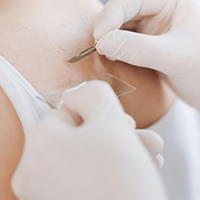
Cosmetic procedures, like botox, soft tissue fillers and lasers may look easy to perform but just because they are available on every street corner doesn’t automatically make them safe, or suitable for you.
A lot of people consider non invasive cosmetic procedures as a low risk regular part of their skin routine, and although popping out in your lunch break to have a quick ‘refresh’ sounds easy, it can lead to significant problems if the person performing these procedures is not properly trained or experienced.
If these procedures are carried out without detailed knowledge, experience and expertise your skin can be damaged, triggering conditions like rosacea and pigmentation, or leaving you with scarring and disfigurement. That’s why it is so important to do your research and take the time to ask about and understand the qualifications of the person you are allowing to treat your skin or face. It is also vital to ask questions so that you can make an informed decision before proceeding with any treatment.
Dermatologist and Fellow of the Australasian College of Dermatologists, Dr Belinda Welsh gives us a few insights below.
Let’s talk cosmetic procedures
Dermatologists are medical specialists in the diagnosis, treatment and management of all skin, hair and nail diseases and conditions, including skin cancer. The extra 4 years of specialist medical training we undergo after medical school means we have a broad and deep understanding of the skin, its anatomy and function and how to diagnose problems accurately. This knowledge extends to an in depth understanding of the treatments available and how best to tailor them for each individual.
Dermatologists are trained in procedures such as soft tissue fillers and lasers which can be used to help medical conditions such as acne scarring, as well as for cosmetic purposes.
Knowing if a procedure is safe for you
Whatever the purpose of the treatment, be it cosmetic or medical, the procedures themselves all require thorough patient evaluation and training, skill and experience.

As dermatologists, our years of specialist medical training means that when people come to us with their concerns we have the expertise to make an accurate diagnosis in the context of their broader health, and to recommend and deliver treatment options that will be most suitable for them.
For example, someone may come in wanting to have a laser treatment to lighten a brown spot on their face they assume may be the result of sun damage but after a proper examination we may determine that the discolouration is actually a form of skin cancer.
Asking questions will help you get the best possible care
When it comes to cosmetic procedures, the decision about who to see is entirely up to you. Whether you choose to see a dermatologist or a non-medical practitioner – our advice is to treat your appointment for a cosmetic procedure the same as you would for a medical procedure. Take it seriously and make sure your treatment provider knows what they are doing.
It is important to ask questions about your skin, your health and your treatment options. It is important to understand as much as you can about your procedure and the person performing it.
Asking questions will help you get the best possible care. Some examples of questions to ask are:
- What are your qualifications?
- How many times have you performed this procedure?
- Will you be the person performing the procedure?
- What are the risks? And are there any risks unique to my health history (including any underlying conditions or allergies)?
- What alternative options are there?
- How long will the results last?
- Will there be any side effects or discomfort and what do I do if I have concerns?
- What are the costs?

Remember, undergoing a cosmetic procedure is not just about your appearance and convenience. It is about your health and safety first.

Dr Belinda Welsh is a dermatologist and Fellow of the Australasian College of Dermatologists
